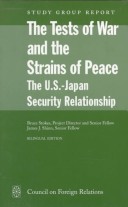As the second half of the 1990s began, the U.S.-Japan security relationship was nearing crisis. The security environment in East Asia had changed with the end of the Cold War. Tensions were rising between Washington and Tokyo over the Okinawa rape incident, the funding of U.S. bases in the region, America's continued commitment to defense of the region, and doubts about Japan's commitment to mutual defense. When the September 1997 revision to the defense guidelines - which elucidated and moderately strengthened Japan's role in the alliance - showed an awareness of the need to adapt, Washington and Tokyo will need to do more to reform their alliance if it is to remain the linchpin of East Asian security. In this climate, the Council on Foreign Relations decided it would be useful to assemble a group of leading U.S. experts on U.S.-Japan relations and a number of Japanese commentators for a rigorous examination of the future of the security relationship. The Study Group, chaired by Harold Brown of the Center for Strategic and International Studies and Richard Armitage of Armitage Associates, sought to identify and explore the fundamental questions that U.S. and Japanese policymakers needed to address to make the alliance relevant for the 21st century. This report summarizes the findings of the Study Group.
- ISBN10 0876092148
- ISBN13 9780876092149
- Publish Date 1 April 1998
- Publish Status Unknown
- Publish Country US
- Imprint Brookings Institution
- Format Hardcover
- Pages 42
- Language English
